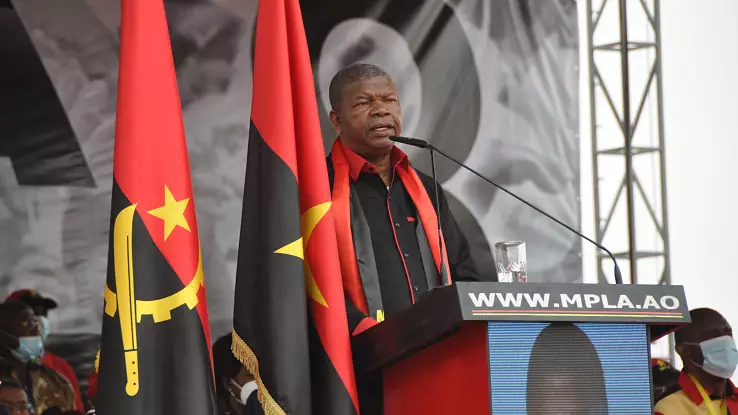Angola elections: ruling MPLA leads with 52% & UNITA 42%
African Editors’ sources have confirmed that most votes in Angola’s parliamentary elections have been counted and provisional results show that the ruling MPLA party is ahead with a 52% majority, whilst their main opposition rivals UNITA party garnered 42%.

The election commission said on Thursday that 86% of ballots had so far been counted, which suggested that former Marxist People’s Movement for the Liberation of Angola (MPLA) was likely to extend its near five-decade stint in power — giving President Joao Lourenço a second five-year term.
The National Union for the Total Independence of Angola’s (UNITA), the opposition party led by Adalberto Costa Junior, did not immediately respond. UNITA dismissed the first provisional results announced by the commission earlier on Thursday as unreliable.
 Angola’s President Joao Lourenco (L) of MPLA party & Opposition leader Adalberto Costa Junior (R) of UNITA party.
Angola’s President Joao Lourenco (L) of MPLA party & Opposition leader Adalberto Costa Junior (R) of UNITA party.
Angola’s ruling party leads in early election results
People’s Movement for the Liberation of Angola (MPLA) has been in power for nearly 5 decades (47 years).
The ruling People’s Movement for the Liberation of Angola (MPLA) is leading in the general elections, according to provisional results released on Thursday by the National Electoral Commission (CNE).
With 33% of the votes counted, the MPLA garnered 60.65% or 1,219,571 votes followed by its main competitor, the National Union for the Total Independence of Angola (UNITA), which received 33.85% or 680,745 votes.
Angolans voted Wednesday in the country’s fifth multi-party elections to choose a president and 220 members of parliament. Eight parties ran in the election but the competition narrowed to the MPLA and UNITA.
More than 14 million Angolans registered to cast ballots.
The MPLA, which has led the oil-rich southern African country since independence in 1975, is criticized for not containing high unemployment, inflation and poverty.
Angolans remain one of the poorest people in the world despite the country’s wealth.
MPLA is led by President Joao Lourenço who is seeking a second term in office.
Lourenço succeeded Jose Eduardo dos Santos, who died last month at age 79 at a clinic in Barcelona, following a long illness.
Dos Santos, who ruled from 1979 to 2017, was viewed by some as corrupt. His daughter, Isabel dos Santos, is linked to several graft incidents.
His body was returned to Angola last weekend and is expected to be buried Aug. 28, his birthday.

Angolan elections: early results spark mixed reactions in Luanda
Angolans in the streets of Luanda remain hopeful after Wednesday’s elections, saying they hope the ‘true’ results will soon become available. They say the young went out in large numbers to vote and chose leaders that will be ready to lead the next generation of Angolans, but are discouraged by early predictions of a win for João Lourenço.

Ballot counting began after polls closed on Wednesday in the oil-rich nation, where multi-party elections were only introduced in 1992.
Preliminary results published overnight by Angola’s electoral commission gave the ruling People’s Movement for the Liberation of Angola (MPLA) 60.65 percent of the vote with 33 percent of ballots counted.
The main opposition group, the National Union for the Total Independence of Angola (UNITA), led by charismatic leader Adalberto Costa Junior, was at 33.85 percent.
The MPLA has ruled Angola for nearly 50 years after the country gained independence from Portugal.
Residents in Luanda reacted with mixed feelings to the preliminary count that was given ample coverage by local media, with state newspaper Jornal de Angola’s front page on Thursday saying: “MPLA leads the count.”
Preliminary results published overnight by Angola’s electoral commission gave the ruling People’s Movement for the Liberation of Angola (MPLA) 60.65 percent of the vote with 33 percent of ballots counted.
“I voted for UNITA, and I do not believe in these results,” said Jorge, a 40-year-old mechanic who did not give his surname, accusing the electoral commission of being in cahoots with the ruling party.
“I feel really bad. The country is not going to change, it’s always the same story.”
Lourenco, a Soviet-educated former general who had promised a new era for the southern African nation when he succeeded veteran leader Jose Eduardo dos Santos five years ago, has trumpeted a list of achievements.
He is credited with making far-reaching reforms, including boosting financial transparency and efficiency in parastatal organisations, fighting sweeping nepotism and corruption, and promoting business-friendly policies to lure foreign investors.
“I am happy, the MPLA has given young people opportunities, there is more work and transparency,” said 27-year-old shopkeeper Madalena Antonio commenting on the early results.
“The government did what it could do. Things will get better.”
Economic woes
But UNITA’s deputy leader Abel Chivukuvuku said the party’s own tally showed it was ahead.
“Our poll counting centres… give us clear provisional indication of a winning trend for UNITA in all provinces of the country,” he told a live streamed night conference. “We are confident, calm and tranquil.”
The MPLA traditionally wields a grip over the electoral process, and state media and opposition and civic groups have raised fears of voter tampering.
Results in past elections have been contested, in a process that can take several weeks.
More than 14 million people were registered to vote.
The election has been overshadowed by Angola’s many woes — a struggling economy, inflation, poverty and drought, compounded by the death of a former strongman president.
Angola is Africa’s second largest crude producer, but the oil bonanza also nurtured corruption and nepotism under dos Santos, who died in Spain last month.
The low-key, night-time repatriation of his remains in the final leg of campaigning has added a macabre touch to the election.
Dos Santos will be buried on Sunday, which would have been his 80th birthday.


























































